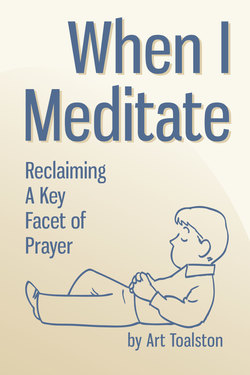Читать книгу When I Meditate: Reclaiming a Key Facet of Prayer - Art Toalston - Страница 3
Chapter 1: A definition A Christian view of meditation
ОглавлениеTo see me meditate in times of prayer, it would not be a very impressive sight.
I’m just sitting there. Usually comfortably.
Seemingly doing nothing.
Or seemingly sleeping, because my eyes are closed and my feet are elevated a bit by a footrest or another chair. If I remain there longer than fifteen or twenty minutes, I think I even might snore sometimes, I’m embarrassed to say.
If, however, you could join me in such moments of prayer – and I surely wish you could – you might be amazed to learn what’s going on. At least I’m amazed nearly every time I meditate, even if it yields but a tender thought or insight about God’s love for me or a few heavenly moments that transcend any earthly activity.
Perhaps a starting point for sharing this experience is to propose a description of it from a Christian perspective:
* Meditation is a prayer encounter with God – the eternal Father, Son, and Holy Spirit.
* It is quiet/solitude with our creator as well as an exchange of thoughts with this divine source of life; it is contemplation on his revelation in the pages of Scripture; and it is petition for oneself and for others.
* While its duration may span a few minutes to an hour or more, there is no “correct” way to meditate. Nor is there a “correct” posture or location for meditation.
* At different moments, meditation can entail a tender responsiveness to the Holy Spirit; a humble sense of awe whenever a divine encounter occurs in the milieu of holy silence; and a divine attentiveness to the words of Scripture, particularly Bible verses that are being memorized and re-memorized and called to mind whenever needed.
* Meditation often is buffeted by a restless or wandering mind and various distractions or interruptions, and certainly these are magnified by any ongoing agony, dire circumstances, or looming crisis.
* Nevertheless, meditation can yield joyous and/or sobering moments of revelation about oneself and the world in which we live. It can stir us toward repentance; it can refresh our souls; it can lead to any number of interactions with the heart of God.
* The precious connection with God may seem very brief, yet fully worth every minute expended in waiting to experience it.
* While meditation may seem to be a “God and me” prayer practice, the transformation it nurtures manifests itself in our thoughts, attitudes, and actions – our graciousness and compassion – in our day-to-day world. Optimally, it stirs us to a sacrificial readiness for God’s passionate redemption to reach the hearts of men, women, and children locally, nationally, and to the ends of the earth.
* Meditation does not override other modes of prayer. It infuses them and deepens them. Our prayers of intercession, for example, likely will become increasingly attuned to the needs of family, friends, and acquaintances. Likewise, meditation is likely to enhance our moments of seeking God’s highest intentions for our lives as well as our exploration of the Scriptures and our yearnings for God’s transforming love to reach all of the world’s peoples. Meditation, most properly, is not an escape from the emptiness, the challenges, and the turmoil in the world but, rather, an empowering to live as a redemptive servant wherever we go.
Innumerable passages of Scripture can be pondered at various times, and some of them memorized over time (and periodically re-memorized) to nurture a wondrous connection with God. The words of Jesus and of Paul and other apostles in the New Testament as well as the psalmists and prophets in the Old Testament – every word, phrase, sentence, and paragraph is part of a divine, dynamic, enduring revelation to mankind.
Regarding, for example, Scripture’s centrality in meditation – and in all of life – a simple New Testament verse, Matthew 4:4, recounts Jesus’ declaration from the Old Testament that every element of God’s revelation is a vital source of spiritual sustenance: “Man shall not live on bread alone, but on every word that comes from the mouth of God.”
Regarding our responsiveness to the Holy Spirit, Paul’s words in 1 Corinthians 2:11-12 convey insight into the process by which God interacts with us: “For who knows a person’s thoughts except their own spirit within them? In the same way no one knows the thoughts of God except the Spirit of God. What we have received is not the spirit of the world, but the Spirit who is from God, so that we may understand what God has freely given us.”
Regarding holy silence, God clearly states in Psalm 46:10 that it is one of the most fruitful pathways to spiritual knowledge: “Be still, and know that I am God … .”
Opening our hearts to God through Scripture, through the Holy Spirit, and through a tender attentiveness to everything that is sacred is to “pray as never before,” as I’ve experienced it, because there is a stirring newness each time we encounter our creator in his wisdom and compassion.
